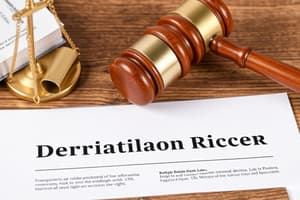Podcast
Questions and Answers
What is the main focus of the book?
What is the main focus of the book?
- The arrest and imprisonment of individuals (correct)
- The regulation of everyday life
- The role of legislatures in creating new laws
- The history of executive power
What is the author's view on the practice of easy arrests and secret imprisonments?
What is the author's view on the practice of easy arrests and secret imprisonments?
- They are a necessary evil in modern society
- They are a common occurrence in every country
- They are a sign of a despotic executive power (correct)
- They are necessary for maintaining public safety
What is one of the risks mentioned in the text regarding the thousands of unknown laws?
What is one of the risks mentioned in the text regarding the thousands of unknown laws?
- People may be fined for breaking these laws
- People may lose their jobs for breaking these laws
- People may be subject to arrest for breaking these laws (correct)
- People may have their property confiscated for breaking these laws
What is the Common Law concerned with?
What is the Common Law concerned with?
What did the revolution in England and the revolution of the American colonies have in common?
What did the revolution in England and the revolution of the American colonies have in common?
What does the history of our ancestors teach us about freedom?
What does the history of our ancestors teach us about freedom?
Study Notes
Deprivation of Liberty and the Role of Government
- The book explores the concept of liberty and examines how government can lawfully or unlawfully deprive individuals of their freedom.
- History shows that executive power tends to lead to arbitrary and unlawful deprivation of liberty.
- Arrest and imprisonment are the most common means by which liberty is taken away.
- Easy arrests and secret imprisonments are characteristic of despotic executive power.
- Legislative bodies constantly produce numerous new laws, which can be oppressive when enforced without proper warrants or summons.
- The passion of modern legislatures to regulate every aspect of everyday life exacerbates the problem.
- The risk of being arrested on sight for breaking unknown laws makes it unsafe for people to leave their homes or travel freely.
- The promiscuous seizures and searches of persons and property played a significant role in historical revolutions.
- The history of our ancestors shows that a people cannot be free if the executive power has arbitrary arrest and imprisonment authority.
- The executive power should be limited and guided by the "law of the land" or "due process of law."
- The Common Law is highly protective of the liberty of citizens and holds that anyone interfering with another's liberty does so at their own risk.
- The Common Law also provides guidelines for making arrests.
Studying That Suits You
Use AI to generate personalized quizzes and flashcards to suit your learning preferences.
Description
Test your knowledge on the concepts of liberty and the lawful or unlawful deprivation of freedom by governments, as explored in the book. Understand the history of executive power leading to arbitrary arrests and imprisonments, and the importance of limiting government authority. Learn about the protective nature of Common Law in safeguarding citizen's liberties.




